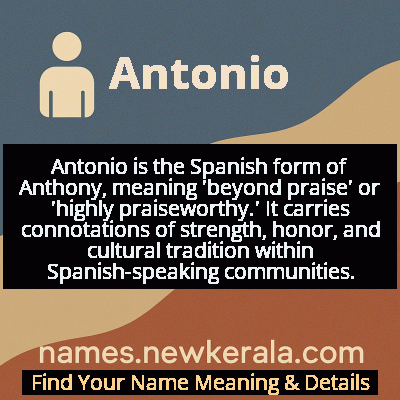Antonio Name Meaning & Details
Origin, Popularity, Numerology Analysis & Name Meaning of Antonio
Discover the origin, meaning, and cultural significance of the name ANTONIO. Delve into its historical roots and explore the lasting impact it has had on communities and traditions.
Name
Antonio
Gender
Male
Origin
Spanish
Lucky Number
7
Meaning of the Name - Antonio
Antonio is the Spanish form of Anthony, meaning 'beyond praise' or 'highly praiseworthy.' It carries connotations of strength, honor, and cultural tradition within Spanish-speaking communities.
Antonio - Complete Numerology Analysis
Your Numerology Number
Based on Pythagorean Numerology System
Ruling Planet
Neptune (Ketu)
Positive Nature
Intuitive, analytical, spiritual, and inquisitive.
Negative Traits
Secretive, reserved, aloof, and can be overly critical.
Lucky Colours
Green, yellow.
Lucky Days
Monday.
Lucky Stones
Cat’s eye, moonstone.
Harmony Numbers
1, 5, 6.
Best Suited Professions
Scientists, researchers, spiritual leaders, detectives.
What People Like About You
Depth of knowledge, analytical skills, spirituality.
Famous People Named Antonio
Antonio Banderas
Actor
Internationally acclaimed Spanish actor known for roles in 'The Mask of Zorro' and 'Desperado'
Antonio Vivaldi
Composer
Italian Baroque composer and virtuoso violinist, famous for 'The Four Seasons'
Antonio Gaudi
Architect
Catalan architect known for his unique style and masterpieces like Sagrada Familia in Barcelona
Antonio Salieri
Composer
Influential Italian composer and conductor, teacher of Beethoven, Schubert, and Liszt
Name Variations & International Equivalents
Click on blue names to explore their detailed meanings. Gray names with will be available soon.
Cultural & Historical Significance
In Hispanic cultures, Antonio represents a bridge between classical Roman heritage and modern identity. The name evokes images of strength, tradition, and family values. It has been particularly prominent in Spain, Italy, and Latin American countries, where it symbolizes both religious devotion and cultural pride. Many towns, churches, and institutions bear the name, reflecting its enduring importance in the cultural landscape of Spanish-speaking communities worldwide.
The name's cultural resonance extends beyond religion into arts, politics, and everyday life. From Antonio Machado's poetry to Antonio Gramsci's political philosophy, the name has been carried by influential thinkers and creators. This multifaceted cultural presence makes Antonio more than just a name—it's a cultural touchstone that connects generations and geographies through shared heritage and values.
Extended Personality Analysis
Individuals named Antonio are often perceived as charismatic, confident, and passionate. They tend to possess natural leadership qualities and a strong sense of responsibility toward family and community. The name carries an air of sophistication and tradition, often associated with people who are reliable, honorable, and deeply connected to their cultural roots. Antonios are typically seen as individuals who command respect through their integrity and consistent behavior.
Antonios are typically seen as expressive and artistic, with a flair for drama and creativity. They often excel in fields requiring communication and emotional intelligence. While they can be traditional in their values, they also possess adaptability and resilience. The name suggests someone who balances strength with sensitivity, capable of both decisive action and compassionate understanding in personal and professional relationships. This combination of traits often makes Antonios successful in careers that blend creativity with interpersonal skills, from entertainment to education to business leadership.
Beyond these general characteristics, Antonios are often described as having a warm, Mediterranean charm that makes them excellent communicators and relationship-builders. They tend to be family-oriented, valuing traditions while being open to new experiences. Their inherent passion often translates into dedication to their pursuits, whether professional ambitions or personal relationships, making them both memorable and influential in their social circles.
Modern Usage & Popularity
Antonio remains a popular and timeless choice in Spanish-speaking countries and among Hispanic communities worldwide. While its popularity has fluctuated over decades, it consistently ranks among the top names in Spain, Mexico, and other Latin American nations. In recent years, the name has maintained steady usage, appreciated for its classic appeal and cultural authenticity. It's often chosen by parents seeking a traditional yet strong name that honors heritage while remaining internationally recognizable. The name continues to be favored across generations, proving its enduring appeal in modern naming practices. Current trends show Antonio being used both as a first name and as a distinguished middle name, often paired with more contemporary first names to balance tradition and modernity. Its cross-cultural recognition makes it a practical choice for families with international connections or aspirations.
Symbolic & Spiritual Meanings
Symbolically, Antonio represents enduring strength, cultural heritage, and spiritual devotion. The name carries connotations of reliability and honor, often associated with protective figures and community leaders. It symbolizes the bridge between ancient Roman virtues and contemporary values, embodying both tradition and adaptability. In metaphorical terms, Antonio suggests someone who stands as a pillar of strength while maintaining emotional depth and artistic sensibility. The name evokes images of Mediterranean passion, family loyalty, and the timeless wisdom passed through generations. Beyond these qualities, Antonio symbolizes the integration of different cultural influences—from its Roman origins to its Spanish evolution and global dissemination. It represents the idea that strength and sensitivity can coexist, that tradition can embrace innovation, and that individual identity can be deeply rooted in collective heritage while reaching toward universal human values.

